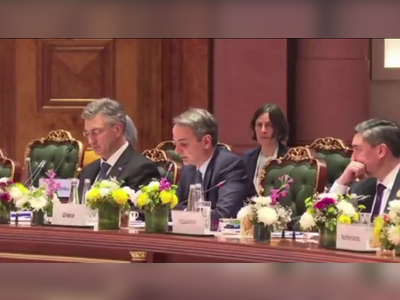Black Lives Matter movement reveals divides among Asian-American community
The spread of Black Lives Matter protests throughout the US reflects a widespread societal reckoning, with sustained demonstrations in hundreds of towns – from New York City to Farmington, Missouri – showing outrage over racism against black Americans.
While the battle lines between those seeking greater equality in law enforcement and those resisting restraints on police are clear from a daily scan of US headlines, George Floyd’s death in Minneapolis police custody last month – and the upheaval that followed – has buffeted the Asian community in more complex ways.
Against the backdrop of the coronavirus pandemic that has sparked violence and harassment directed at Asian-Americans, as well as a rapid unravelling of US-China relations over trade and national security issues, many in the community were either primed or compelled to speak out about racial discrimination when Americans began taking to the streets.
“This is your perfect storm,” said Frank Wu, president of City University of New York’s Queens College. “There is a black-white racial divide. On top of that, you have a trade war, cultural war, Cold War and some people predict – some people who aren’t crazy predict – a possible shooting war.”
“Asian-Americans are in the debate whether they want to be or not”, said Wu, a former president of the Committee of 100, a Chinese-American advocacy group founded by late architect I.M. Pei that includes Yahoo co-founder Jerry Yang and world-renowned cellist Yo-Yo Ma.
“There is no middle ground because if you say that you’re not going to take sides, people will interpret that as taking a side,” he added.
While Asian communities have largely supported demonstrations calling for law enforcement reform and other measures that would stop deaths like those of Floyd, Breonna Taylor, Ahmaud Arbery and other black Americans, disputes have broken out over who is complicit.
A statement released by the Boston-based Asian-American Commission (AAC) sparked one such conflagration by referencing “the deep roots of anti-Blackness within the AAPI [Asian-American and Pacific Islander] community”.
“Asian Americans continue to benefit from the ‘model minority’ myth and our historic proximity to white privilege,” the AAC said. “The fact that an AAPI police officer stood by while George Floyd was murdered is horrific and unacceptable.”
Minneapolis police officer Tou Thao, a Hmong-American, stood just a few feet away while officer Derek Chauvin kept his knee on Floyd’s neck for nearly nine minutes. The officers have been fired.
Some in the Asian-American community challenged the group’s statement.
Wilson Lee, co-founder of the Boston chapter of the Chinese-American Citizens Alliance and sixth generation Chinese-American, took issue with the AAC statement for not recognising contributions that many in the Chinese-American community are trying to make in the effort to support other ethnic minority groups, including the black community.
The Covid-19 pandemic, which has disproportionately affected black Americans, has prompted some in the Asian community to address the issue.
In New Jersey, one of the hardest hit areas of the US, black Americans accounted for 19 per cent of deaths even though they represent 13 per cent of the state’s population, according to The Covid Tracking Project, published by The Atlantic.
Asians, meanwhile, accounted for 6 per cent of Covid-19 deaths and 10 per cent of the population. Whites represented 55 per cent both for cases and deaths.
The Asian-American Business Development Centre (AABDC), for example, teamed up with civic organisations Hispanic Federation and 100 Black Men of America to raise money for surgical masks. The AABDC Covid-19 Fund raises funds to buy and distribute surgical masks for black and Hispanic communities.
“A disproportionately high number in these communities live in densely-populated areas like Queens, New York City and Brooklyn, where social distancing is very hard to apply,” Jing Li, AABDC’s programme manager said in an interview when the fund was launched in April.
“We have more access to the manufacturers of personal protective equipment and we felt it was time to show support.”
Lee said AAC’s statement diminishes acts of good will and philanthropy that groups like his are trying to expand to support black Americans.
“Am I worried that people will misinterpret that statement [about anti-Blackness]? Yes. Asian-Americans are already in a bad situation because of the coronavirus,” Lee said.
“There are a lot of nutcases out there who could care less about George Floyd, who could care less about equality, and are just hijacking the situation.”
Divisions within the Asian-American community were stirred up days after Floyd’s death when an impassioned letter posted online by Yale University undergraduate Eileen Huang warned of “the rampant anti-Blackness in the Asian-American community that, if unchecked, can bring violence to us all”.
“We Asian-Americans have long perpetuated anti-Black statements and stereotypes,” Huang wrote.
“I grew up hearing relatives, family friends, and even my parents make subtle, even explicitly racist comments about the Black community: ‘They grow up in bad neighbourhoods’. ‘They cause so much crime.’ ‘I would rather you not be friends with Black people.’ ‘I would rather you not be involved in Black activism.’’’
Huang’s plea reflects a generational division between Asian-Americans when it comes to race, and sparked a conversation within the community.
“I’m fascinated by that letter” because it reflects the ethos of China’s Cultural Revolution, when the Chinese needed to articulate their position on social issues or become ostracised, said Yingyi Ma, an associate professor of sociology at Syracuse University. “It has really drawn this [generational] dynamic out into the public.”
In response to Huang’s letter, a Harvard University undergraduate named Kalos Chu shared a WeChat post by a Chinese-American identified only as “Yitao”, who responded to Huang’s assertions.
Yitao said older generations of Chinese-Americans faced “difficulties unimaginable to you to come to the US, to fight stereotyping and racism, overcome challenges in a new language and culture”.
“If there is a way for Chinese-Americans to make their unique contribution to social justice, sharing our cultural values is probably the one. And we can and should do a better job at this. We need your help to let whites, blacks, browns to better understand Chinese-Americans, not to box us in.”
Those of Huang’s parents’ generation, whether in China or the US, generally prefer to circumvent discussion of politics and socioeconomic issues, said Ma, who wrote a book about Chinese students in the US.
“They have memories of the Cultural Revolution and they understand how divisive and how difficult it was and how much destruction it caused,” she said.
These disputes also stem from different viewpoints over how skin colour defines the Asian community in the US, said Russell Jeung, a professor of Asian-American studies at San Francisco State University.
“Asian-Americans find it difficult to find their position in American society, and so when they address Black Lives Matter they don't know if they are white or black,” Jeung said. “That's because we are not black, nor are we white, and so they have to recognise that there’s another positioning of Asians in the American racial dynamic, and that’s whether we’re outsiders or insiders.”
Some controversial viewpoints have little to do with generational differences or racial identity.
Xia Yeliang, a signatory to the human rights manifesto Charter 08, has spoken out in support of military deployment to quell unrest in the US.
Hu Ping, editor of pro-democracy journal Beijing Spring and a key figure in China’s pro-democracy movement in the 1970s and 1980s, has gone so far as to argue that there is no systemic racism in the US, much to the outrage of others in the human rights advocacy community.
In a Twitter post on June 6, Hu pointed out that Washington’s mayor Muriel Bowser is a black woman and lauds the high proportion of blacks who work in the city’s government before questioning the assertion that there is systemic racism in the US.
Tang Baiqiao, a leader of the 1989 pro-democracy movement in China, said of the Black Lives Matter protests in a Twitter post: “These anti-Trump elements are crazy!”
Tang criticised Bowser for not allowing the National Guard to stay in a Washington hotel at the city’s expense, a matter that led to friction with President Donald Trump, whose administration ordered the military deployment to the capital city.
“The National Guard, responsible for maintaining order and stopping the smashing, was expelled by the mayor of Washington from the hotel where they lived!” Tang said in the post.
“Could it be that the White House was captured? The White House was attacked and the President’s security became a concern. What does the mayor want to do? Hope Trump is attacked?”
Queens College’s Frank Wu says the wide range of opinions within the Asian-American community might not have come to light without so many people stuck at home, with more time to peruse and engage on social media.
“There is just tremendous internal diversity,” he said. “There are Asian-Americans who are leftist radicals. There are Asian-Americans who love Trump. There are Asian-Americans who are more interested in so called homeland politics. It is no surprise to me to see these differences.”
















